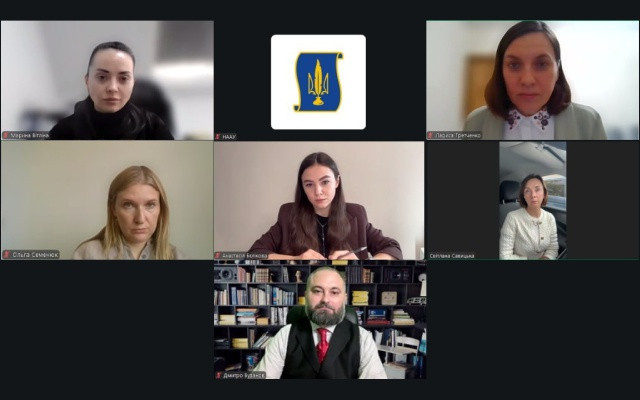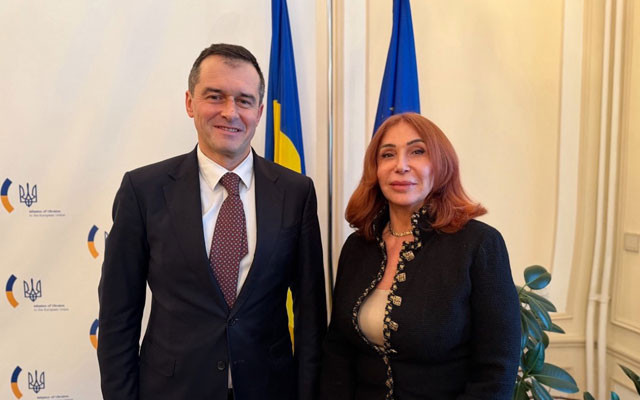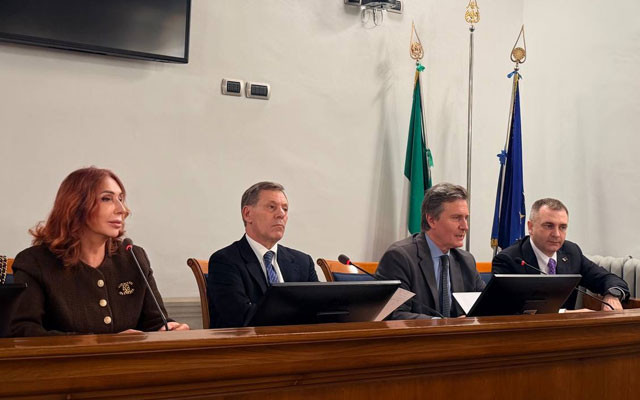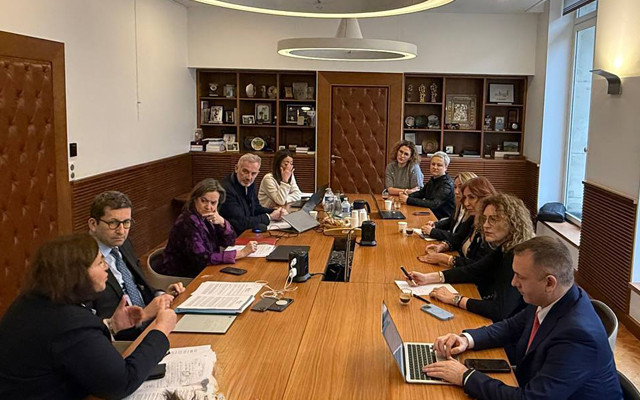Law and feelings: advocates explore contemporary challenges in family law

Marriage and divorce are not only legal procedures, but also social phenomena that require a responsible approach. The UNBA Committee on family law organized and held a professional discussion on the topic «Conscious» marriage and «prudent» divorce: challenges, risks, consequences».
Terminology matters
The deputy chairman of the Committee Svitlana Savitska shared her observations on the impact of procedural law on the perception of the institution of marriage. She drew attention to the term «minor case», which, according to the provisions of the Civil Procedure Code, covers divorce cases.
The speaker emphasized that, although from a legal point of view, the legislator defined this approach to simplify the judicial procedure, the lexical meaning of the word «minor» in everyday perception has a different connotation — «insignificant». This, in turn, creates a false impression that marriage is something trivial and of little social importance. Words shape our thinking, emotions, and behavior, and language directly influences our perceptions, beliefs, values, and moral principles.
Therefore, the term «insignificant matter» is a value judgment, and its use in relation to family legal relations is, in the advocate's opinion, unacceptable. Such formulations undermine respect for marriage and ignore its social and personal significance.
The legislator should avoid evaluative concepts in normative acts and instead use neutral and accurate legal terminology that corresponds to the essence of legal relations, S. Savitska believes. Despite the fact that from a procedural point of view such cases may be considered uncomplicated, they always have an emotional dimension, which significantly complicates their consideration.
Marriage contract
Member of the Committee Anastasia Belikova highlighted the advantages of a marriage contract as a preventive tool for avoiding conflicts, focusing on the importance of the contract for legal certainty, the division of complex assets, protection from economic violence, and the settlement of maintenance and child support rights.
According to the speaker, a marriage contract is a sign of a conscious marriage and a mechanism for clear rules and predictable agreements, which contributes to the formation of a mature legal culture.
She analyzed the Supreme Court's approaches to resolving specific practical issues:
- interpretation of a marriage contract in favor of validity – favor contractus (resolution of 05.03.2025 in case No. 362/1998/23);
- challenging fraudulent transactions by the executor (decision of 10.09.2025 in case No. 367/252/24);
- inadmissibility of concluding a marriage contract through a representative (decision of 25.09.2019 in case No. 757/10715/17-ц);
- assessment of an extremely unfavorable financial situation (decisions of 7 November 2022 in case No. 336/3695/21, of 9 October 2019 in case No. 713/1964/16-ц).
Opportunities for digitalization
Member of the Committee Olga Semenyuk focused on the key aspects of digitalization in family law.
She emphasized that digital tools open up new opportunities for access to justice, allowing clients to choose an advocate from any city or country, communicate with them at any time, and even go to court while abroad. At the same time, the advocate highlighted the difficulties in concluding contracts for the provision of legal assistance in the absence of an electronic signature or the Dіia application.
O. Semenyuk also emphasized the importance of confirming the authenticity of electronic documents, as documents submitted to the court must correspond to the original. The speaker paid special attention to remote court hearings, noting their convenience, while warning about the risks associated with communication quality and confidentiality.
Marital reconciliation
An important element of Ukrainian family law is the institution of marital reconciliation, which is designed to ensure the stability of family relations and promote the peaceful resolution of conflicts. At the same time, according to member of the Committee Marina Vitlina, its effectiveness depends on a substantive, rather than a formal, approach by the court.
In most cases, granting a period for reconciliation does not lead to the restoration of family relations. On the contrary, it only prolongs the consideration of the case and creates additional psychological stress on the parties, especially if one of them does not wish to continue the marriage. Thus, the real effectiveness of this institution is extremely low, and its application often appears to be a formality.
In cases where the spouses are genuinely willing to work on preserving the family, this institution can perform its positive function. However, in situations where the marriage has effectively broken down, the application of reconciliation measures only prolongs the process and is contrary to the interests of the parties. As an example, M. Vitlina cited case No. 707/129/25 (decision of the Cherkasy District Court of Cherkasy Region dated 05.02.2025), in which the defendant stated that she needed time for reconciliation in order to resolve property obligations with the plaintiff regarding the loan agreements they had concluded.
Default judgment
The practical aspects of ex parte proceedings in family law were examined by representative the Committee in Kyiv Dmytro Buzanov. He explained how the procedure provided for in Article 280 of the Code of Civil Procedure could come as a «surprise» to one of the parties.
The speaker reminded that a default judgment is rendered in the absence of the defendant without valid reasons, if he or she has been duly notified and has not filed a response. But in practice, this often leads to violations of the principle of proper notification, especially in conditions of martial law and migration.
One of the key practical risks, illustrated by real-life examples, is the disregard of the foreign element in court disputes. The speaker cited a case of divorce registered abroad in 2014, where the defendant learned of the decision by chance through the Unified State Register of Court Decisions, rather than through official notification (case No. 606/191/23). The plaintiff concealed the defendant's current address abroad, indicating the old registration address, which led to the «lost» summons.
According to the Law «On international private law», Ukrainian courts may accept and consider any cases with a foreign element if the parties have provided in their agreement for the jurisdiction of Ukrainian courts over cases with a foreign element and if the defendant in the case has a place of residence or location, or movable or immovable property that can be seized, or a branch or representative office of a foreign legal entity-defendant on the territory of Ukraine. This requirement was not met in the case, as a result: the default judgment was rendered unlawfully, and as a result of the review, the proceedings in the case were closed. Therefore, D. Buzanov advised to always check the Unified State Register of Court Decisions and monitor cases under one's name to avoid duplication of lawsuits.
He emphasized that if the decision has entered into legal force (Article 289 of the Code of Civil Procedure), an appeal is possible through a motion for review within 30 days from the date of the announcement (Article 284 of the Code of Civil Procedure), with the possibility of renewing the deadline for valid reasons, such as improper notification.
Between law and abuse
Chairman of the Committee Larysa Gretchenko presented the distinction between the concepts of «invalid marriage», «fictitious marriage», and «unregistered marriage», the difference in legal grounds, the procedure for establishing them, and their legal consequences.
In reviewing the legal consequences of the invalidity of a marriage, the speaker drew attention to their special nature for a person who did not know and could not have known about the obstacles to the registration of the marriage. The invalidity of a marriage does not affect the scope of the mutual rights and obligations of the parents and the child born in that marriage.
L. Gretchenko presented situations that demonstrate the current practice of fictitious marriage as one that is entered into without the intention of creating a family, usually for the purpose of obtaining certain benefits (the desire to obtain inheritance, housing, social benefits, or other property advantages). Signs of a fictitious marriage include: separate residence, lack of joint property, family relations, care for each other, denial of marriage to other persons, etc.
Such a marriage may be a means of committing fraud (Article 190 of the Criminal Code), evading conscription into military service (Article 336 of the Criminal Code), illegally transporting persons across the border (Article 332 of the Criminal Code), or human trafficking (Article 149 of the Criminal Code).
The concept of an unregistered marriage corresponds to the concepts of free will and consent to marriage. The inability to establish mutual consent of the parties in accordance with practice (resolution of the Constitutional Court of Ukraine dated July 9, 2025, in case No. 755/12077/23) is decisive in recognizing a marriage as unregistered.
The chairman of the UNBA Committee also emphasized the inadmissibility of abuse of rights and the adequacy of the use of private law instruments (in particular, establishing the fact of cohabitation, recognizing an unfinished construction project as joint property, and recognizing the right to a share in joint property) specifically to protect a violated right or interest, and not to avoid or prevent the enforcement of a court decision. This issue was examined by the Supreme Court in case No. 522/2736/16-ц (decision of the Civil Court of Cassation dated 27 October 2021). The decision on the presence or absence of abuse is left to the discretion of the court.
***
Thus, the discussion of issues of terminology, marriage contracts, digitalization, reconciliation of spouses, and the limits of lawful behavior has shown how important it is to ensure a balance between formal law and life circumstances. And the task of lawyers is to help clients not only to divorce in a civilized manner, but also to make this process conscious and minimize conflicts and emotional losses.
Popular news

Self-government
The BCU demands a review of the composition of the government working group on reforming the advocacy profession
The President of the UNBA, BCU Lidiya Izovitova, appealed to the Cabinet of Ministers of Ukraine to review the composition of the working group on improving legislation in the field of advocacy and legal practice.

Discussion
Why lowering the age of marriage lacks legal logic
Although until 2012 there was a provision in family law that allowed children to marry from the age of 14 under certain circumstances, its return to Ukrainian law would contradict international obligations and the logic of criminal law.

European integration
Open dialogue between the UNBA and the European Commission on the path to EU
The Ukrainian National Bar Association held a working meeting in Brussels with Mr Wolfgang Nozar, Head of Unit for Governance, Rule of Law and Financial Assistance, Directorate-General for Enlargement and Eastern Neighbourhood (DG ENEST), European Commission.

Self-government
A report on Ukrainian advocacy was presented in the European Parliament
Can a shadow report on advocacy replace the political framework of the Roadmap on the rule of law with demands for the restructuring of self-government? Where is the line between accountability and the seizure of institutions? And how can we respond to narratives with data rather than impressions?

European integration
UNBA and Ukraine's representation to the EU have synchronized their priorities
On February 5, in Brussels, the President of the UNBA, BCU Lidiya Izovitova held a working meeting with the Ambassador Extraordinary and Plenipotentiary of Ukraine, Representative of Ukraine to the European Union Vsevolod Chentsov.

Guarantees of the practice of law
Proceedings opened following attack on advocate in Dnipro
The Committee for the protection of advocates' rights and guarantees of legal practice of the UNBA appealed to law enforcement agencies in connection with an advocate's report of an attack while performing his professional duties. The information was entered into the Unified Register of Pre-trial Investigations and a pre-trial investigation was initiated.

Interaction
«With us — to Europe»: Italian advocacy supports UNBA initiatives
On January 30, a meeting was held in Rome between a delegation from the Ukrainian National Bar Association and the National Bar Council of Italy (Consiglio Nazionale Forense, CNF) on the standards and practices of the legal profession and their significance for Ukraine's European integration process.

Interaction
France confirms cooperation with UNBA on reforms in the field of the rule of law
On January 29, a working meeting between representatives of the Ukrainian National Bar Association and the French National Bar Council (Conseil National des Barreaux, CNB) took place in Paris.
Publications

Volodymyr Matsko Extradition as a systemic form of rights violations

Victoria Yakusha, Law and Business The anti-corruption vertical cannot «take care» of the Bar as an institution, - acting head of the HQDCB

Censor.net Protecting advocates – protecting justice: addressing concerns about the new law

Ihor Kolesnykov A BRIEF SUMMARY REGARDING THE APPLICATION OF THE ORDER ON EXTENDED CONFISCATION IN LATVIA REGARDING FINANCIAL ASSETS OF…

Valentyn Gvozdiy WORKING IN A WAR ZONE

Lydia Izovitova Formula of perfection

Sergiy Vylkov Our judicial system is so built that courts do not trust advocates

Iryna Vasylyk Advocacy in the proclamation of Independence of Ukraine
